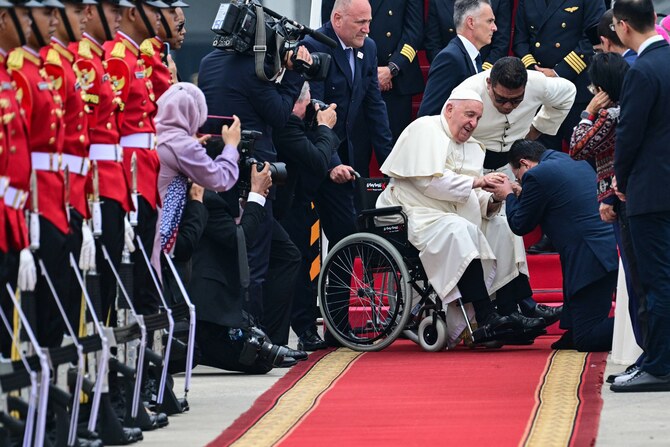JAKARTA: Pope Francis arrived in Indonesia on Tuesday, the first stop of the longest trip of his papacy where he is set to meet members of the Catholic community and participate in an interfaith meeting with religious leaders in the world’s largest Muslim-majority country.
Francis, who will also visit Papua New Guinea, East Timor and Singapore over the next 10 days, was seated in a wheelchair as a lift disembarked him from a chartered commercial aircraft at Jakarta’s Soekarno-Hatta airport.
He was welcomed with a bouquet of local produce presented by two children dressed in traditional clothes and then greeted by Indonesia’s religious affairs minister, its Vatican envoy and a number of bishops on a red carpet flanked by honor guards.
The 87-year-old pontiff then climbed into a waiting car and was taken to the Vatican Embassy, where he is staying for the rest of his trip in Indonesia.
Indonesia’s President Joko Widodo welcomed the pope, saying in a broadcast statement that the country and the Vatican “have the same commitment to fostering peace and brotherhood, as well as ensuring the welfare of humanity.”
Francis is the third pope to visit Indonesia, after Pope Paul VI in 1970 and Pope John Paul II in 1989.
“This visit is an extremely historic visit … On behalf of the Indonesian people, I warmly welcome and thank His Holiness Pope Francis (for this trip) to Indonesia,” Widodo said.
The pontiff’s first full day of activities will begin on Wednesday with meetings with the country’s political leaders — including Widodo — young people, diplomats and the Indonesian clergy.
A key highlight of Francis’ visit to Indonesia is his participation on Thursday in an interfaith meeting with representatives of the six religions that are officially recognized in the country: Islam, Buddhism, Confucianism, Hinduism, Catholicism and Protestantism.
The event will take place at Istiqlal mosque, the largest in Southeast Asia and a symbol of religious freedom and tolerance. It is linked via a “tunnel of friendship” to the capital’s main Catholic cathedral, Our Lady of Assumption, which Francis will visit with the grand imam, Nasaruddin Umar, before they sign a joint declaration.
Leaders of Indonesia’s second-largest Islamic group, Muhammadiyah, said Francis’ visit showcased his commitment “to build and strengthen relations” between Catholics and the Islamic world, as they urged the Indonesian government to raise the issue of Palestine in meetings with the pontiff.
“It is imperative for Indonesia to make the visit and meetings with Pope Francis a momentum to take initiative and … find a permanent solution for the future of Palestine by involving different stakeholders at the global level,” Muhammadiyah leaders said in a statement.
Catholics make up about 3 percent of the country’s 270 million population, compared to the 87 percent who are Muslim.
When Francis presides over a mass for some 70,000 people at Jakarta’s main stadium on Thursday, some of the attendees will have come from other parts of the archipelago nation, traveling long hours to see the head of the Catholic Church.
Aluysius Sigit, a pastor from Lampung province, will travel around 600 km to the Indonesian capital as part of a delegation of about 1,000 people from the Roman Catholic Diocese of Tanjungkarang.
“We are overjoyed and happy … very grateful to God that we will be able to see Pope Francis, the spiritual leader of the Catholic Church,” Sigit told Arab News.
“His visit embodies the Catholic Church’s devotion to maintain peace and religious tolerance.”
Worshippers from the Roman Catholic Diocese of Sanggau, located in West Kalimantan province, have also been arriving in Jakarta since Monday to attend the upcoming mass.
“There are about 240 of us … First we must drive to Pontianak, which takes about 3 to 4 hours, and then we take a flight to Jakarta,” Father Leonardus from the Sanggau diocese told Arab News.
Leonardus said his congregation was “very enthusiastic” to see Francis, as he was looking forward to the pontiff’s agenda in Indonesia and how it will impact the country’s Catholic community.
“We are very happy because the pope will visit Istiqlal and meet with religious groups, it shows how open and very tolerant we are,” he said.
“For Catholics, this is an opportunity to foster brotherhood, extending beyond our little community in Kalimantan to reach the whole of Indonesia, because we’ll get to meet our brothers and sisters from other provinces.”




























